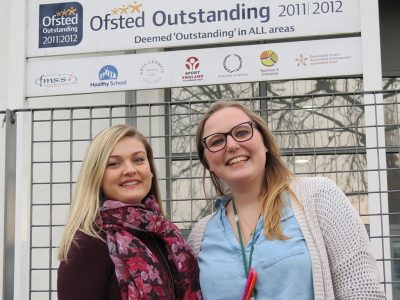
Kaleigh Kupstis ’15 (ED), ’16 MA spent the fall semester of her master’s year in England as part of the Neag School’s Study Abroad Teaching Internship Program. In England, she taught students at Rooks Heath, a multicultural school in London with about 1,000 students ages 11 to 18. Kupstis is a graduate of the Neag School’s Integrated Bachelor’s/Master’s program; she now serves as a teacher at Lincoln Middle School in Meriden, Conn.
Hometown: Southington, Conn.
Concentration: Secondary education
You did your student teaching previously at Bulkeley High School in Hartford. How has what you’ve experienced with students in London differed from that setting? “I feel like in London, ‘diversity’ is a whole new term. You have students coming in from Syria, Romania, Turkey, and you have a whole range of languages that you have to address. It’s differentiation at its finest.”
What is one major takeaway from your experience in London that you will bring with you in your career? “Never take a student’s actions at face value. There’s always a bigger story there. There’s always something more that’s going on. So really getting to know students is absolutely crucial. … That has been my biggest takeaway: how important it is to get to know your students.”
“That has been my biggest takeaway: how important it is to get to know your students.” Kaleigh Kupstis ’15 (ED), ’16 MA
What differences have you seen between how classrooms in the States are led versus in the U.K.? “I think a strength from the U.S. is the student-centric perspective. As teachers … we feel as though [students] will learn more when they are around people that they trust and care about. I think here [in the U.K.], it’s a bit more content-based and a bit more authority-driven. They kind of hammer home discipline here.”
Has this experience fine-tuned how you think about what works best for you in the classroom? “I think every single one of us has said, in a joking way, but also with a tone of seriousness, that we’re going to be more strict when we get [back to teaching in U.S. classrooms], because structure is a good thing. I feel like I was definitely the fun, bubbly English teacher, and I let things slide. I think now we have more tactics on how to deal with discipline when we go [back to classrooms in the U.S.].”
How has your coursework here in London helped you understand the U.K.’s approach to education? “Chrisitine [Barry] took a reflective approach [as the London instructor for our coursework in cultural competence]. We had a journal we wrote every single week; her responses are tailored to you. She talks a lot about the mental process you go through when you leave your own culture and are looking at things not as ‘Here’s what we do in the U.S. [versus what] they do here,’ or ‘What’s better?’ … It’s more like: ‘They do it this way. It’s different; it’s neither better or worse.’ When I saw teachers being very authoritarian, I was thinking to myself, ‘How are they going to achieve relationships with the students?’ But that’s not the end goal.”
Looking back, is there anything you would have changed about your experience in London? “Right off the bat, I would have dropped my whole ‘I want to work in an English classroom.’ I would have instead said, ‘Put me in an [English for Speakers of Other Languages] classroom’ — where they teach kids coming in how to read emails and how to send letters — more of a functional skills class, because they have those types of classes here. … I think by the end of October, I did start going to those other classes. And then kids got used to seeing me, and I found relationships with them, so that was great.”
 Facebook
Facebook
 Twitter
Twitter
 LinkedIn
LinkedIn
